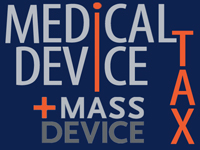
A bipartisan duo of U.S. Representatives criticized the editorial board of the Washington Post this week over an editorial that called the Senate’s recent non-binding vote to repeal the medical device tax a "budget-busting mistake."
The editorial, published on March 22, depicted the device tax as the medical device industry’s reasonable share of a healthcare reform measure that would bring health insurance to 27 million people, a measure that’s projected to cost about $1.2 trillion over 10 years.
"Asking the medical device industry to chip in 2.5% of that doesn’t seem unreasonable, given the $100 billion-plus sector’s profitability – which is bolstered by federal programs such as Medicare and Medicaid," the editors wrote.
Last Thursday, the Senate voted 79-20 in favor of a bipartisan amendment to repeal the medical device tax. The non-binding measure, proposed by Sens. Amy Klobuchar (D-Minn.) and Orrin Hatch (R-Utah), was part of the Senate’s continuing budget resolution.
The article briefly targeted several of the tax repeal opposition’s primary arguments, particularly that the levy, which is expected to generate about $30 billion in federal revenue over 10 years, will result in more than 40,000 lost U.S. jobs and that it will incentivize companies to ship those jobs overseas. The editors called those arguments a "doomsday scenario" which "falls apart on closer inspection."
The medical device tax contains no inherent incentives to ship jobs overseas because it taxes all devices sold in the U.S., including imports, the editors noted.
And although the 27 million newly insured people skew mostly from a younger demographic and are unlikely to be comprised highly of the older patients who are the prime customers of the medical device industry, "their additional device usage won’t be zero," according to the Washington Post editors.
More medical device tax coverage from MassDevice.com.
Those arguments missed the point of the repeal efforts, according to Reps. Erik Paulsen (R-Minn.) and Ron Kind (D-Wisc.), who responded to the editorial this week with a letter to the editor.
They countered the "windfall" rhetoric that medical device makers will reap a benefit from the newly insured patients, citing Massachusetts as a state where expanded insurance access didn’t bump revenue for the medical device industry, which has a heavy presence in the Bay State.
The Reps. further justified medical device tax repeal as a means of protecting an important U.S. industry, one which is facing ever-increasing competition on the global market.
"It is crucial that we enhance our strengths and export American ingenuity," Paulsen and Kind wrote. "Repealing the medical-device tax will allow today’s entrepreneurs – whether working in a university lab or their bedrooms – to become tomorrow’s visionaries."

